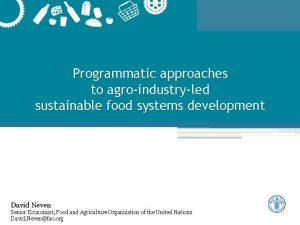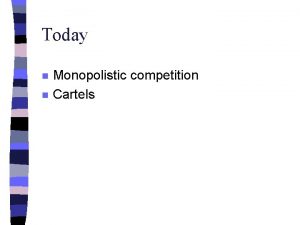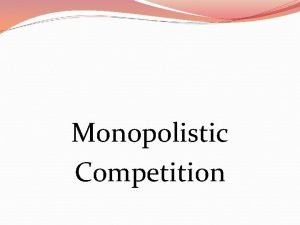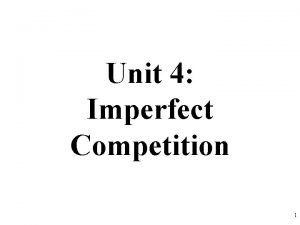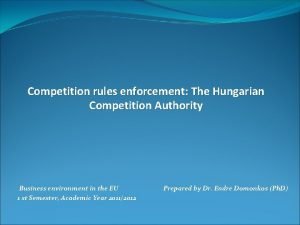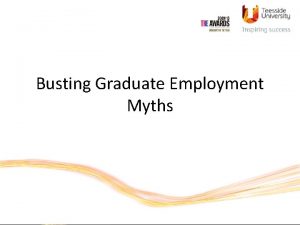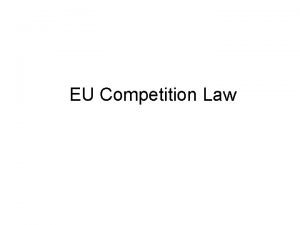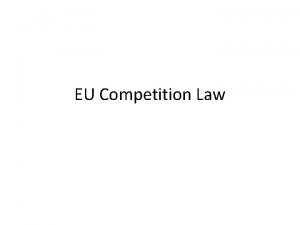Competition enforcement in nonacceding countries Damien Neven Graduate











- Slides: 11

Competition enforcement in non-acceding countries Damien Neven (Graduate Institute of International Studies, Geneva and CEPR) Workshop on “EU enlargement : regulatory convergence in non-acceding countries” Athens – November 7, 2003

Introduction • More competition from firms in acceding countries • In domestic markets but also in export markets • Faster growth in some export markets • What should be the response in terms of competition enforcement ?

Introduction (II) • Enforcement of competition rules in the domestic markets – Scope of activities – Legal framework – Appropriate institutions • Coordination of competition enforcement across jurisdictions – Bilateral agreement with the EU – And beyond

Domestic enforcement • « economists might serve a more useful purpose if they fought fires or termites instead of monopoly » - Stigler (1966) • Indeed, the effect of final consumers is often small… • But « the quiet life » is the best of all monopoly rents • Competition matters more to enhance productive and dynamic efficiency – Consider wood pulp and cement (Aiginger, 1997). Deadweight loss are 1. 85 and 2. 56 % of sales. The cost inefficiencies are respectively 7. 93 and 7. 66 % of sales – Consider a sample of firms (Nickell, 1998) operating in different environments. Firms exposed to high rivalry experience a TPF growth 4 percentage points higher than those exposed to weak rivalry

Domestic enforcement (ii) • In transition and developing economies, effective enforcement is highly correlated with the development of efficient private firms (Dutz, 2001) • Competition and graudualist innovation • Competition is a substitute for external shareholder control by a financial institution – when shareholder control is internal (as often in transition), competition is more important

Domestic enforcement (ii) • Public restraints (trade impediments, investment policies, sectoral regulations) may matter more than private restraints (anti-competitive agreements and practices) • Competition authorities have an important role to play as advocates of competition regarding public restraints • Their position needs to be secure within government • Approximation of laws ? This is not a priority (fast moving target)

Domestic enforcement (iii) • Is the control of state aids a priority ? • Is state aids an internal market policy or a competition policy ? In the Community, it is currently implemented as a policy to achieve a level playing field (across firms, mostly within countries) • It may be more useful when there is excessive public intervention • Beware of geographic market definition, the protection of competition vs competitors and industrial policy

Domestic enforcement (iv) • Institutions are prone to capture – they can be led to pursue different objectives from those that they have been assigned • Independent (terms of appointment, publication)…yet accountable • Bureaucratic capture may be the most important risk • Administrative procedures are not appopriate when there is substantial discretion - At the very least, an administrative tribunal is required • Do not approximate with the EU in this area.

International enforcement (i) • The tale of the cement cartel • And that of the aluminium cartel • Rents in prosecuted cartels amount to 20 b $ (more than what the liberalisation of the agricultural sector could bring) • One cannot rely on the EU (or the US) to prosecute international cartels • Export cartels • Predatory mergers

International enforcement (i) • A cooperation agreement with the EU is necessary – and one in which cooperation is not determined on a case by case basis • But integration in a broader framework is an important complement

Conclusion • Competition enforcement will help making the most of neighbours’ accession • An opportunity to implement competition policies that are best suited to the environment • Convergence of markets does not require regulatory convergence in the transition



